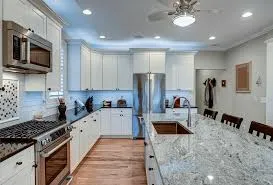Choosing the Right Countertops: Granite vs. Ceramic Worktops

Introduction
The correct choice of the countertop is always an important step defined by the overall atmosphere and utility of the space under the makeover. Thus, we offer the detailed and comprehensive comparison of the two types of worktops: granite and ceramic with the means to help you decide on your option.
Natural Beauty over Man –Made Cleverness
Granite:
Self-Contained Durability Granite worktops especially favor Nature’s creation since they are a natural product, offering elegant uniqueness in their inherent thoroughness. These granites are extracted in blocks, and each will have a unique vein and color making each place where they are used to be unique in a way. It also guarantees that any two fabricated granite countertop surfaces will not be the same, which is advantageous for those who love to have individual items with natural looks.
Ceramic:
Engineered Elegance Ceramic worktops are made from fine clay which is then molded, hand painted and finally baked. The manufacturing process above enables the company to produce a very many constant colour and designs as compared to natural stone material. Ceramic worktops allow for choice of colours that may be made to suit particular requirements and because of this, each worktop is made in a way that is specific to the client.
Visual Appeal
Granite
Granite Adds sheen a touch of sophistication and fabulous look to any room that they are installed in. Granite worktops make an attractive part as it provides and comes in rich surfaces and different hue adding to the general design noble. Thus, granite slabs themselves have certain imperfections, which are appreciated by those who would like to incorporate an individualistic accent into their interiors.
Ceramic
Ceramic countertops are both beautiful and functional. They can come in most color and texture combinations as to fit any home’s aesthetic. The production process is well controlled, and this makes the ceramic worktops to be sleek, simple for design, which will fit perfectly well in new, modern or traditional homes.
Durability and Maintenance
Granite:
A consume product while at the same time requiring a lot of maintenance Granite is known to last long but it needs a lot of attention to keep it looking as good as new. Glass is sensitive to scratching, staining, and etching; it must be recoated periodically because the surface is porous.
Ceramic:
Ceramic worktops that are used by Low Maintenance and Resilient are extremely hard wearing, and very easy to maintain. They do not conduct heat, scratch easily or break, are non porous thus require no regular sealing for them to remain in good condition. This makes ceramics an attractive material for those who prefer their products or furniture to be easy to maintain, readily available and less complicated.
Cost Considerations
Granite
The price of granite depends with the kind of grain and its origin. In general, granite is considered to be affordable for people who want to improve the look of interior or exterior of their living premises using natural stone.
Ceramic
Ceramic worktops will also cost differently depending on how elaborate or elaborate the material is. Its main advantages are a relatively low price compared to other types of natural stones including granite, and it can be used for creating a solid and stylish covering.
With every option between granite and ceramic worktops, one needs to make their choice based on aspects like look, care, and basically costs. Granite has a rich and unique appearance that is found in nature making it perfect when one wants to introduce some class and style into a room. Ceramic in turn offers an adjustable, long-lasting timeless material good for most designs and with easy maintenance. It is understood that both materials have their advantages to offer and your selection depends on your preference and the limit of utility.
Environmental Impact
Although both granite and quartz are environmental friendly, some people who own homes have a concern toward the environment.
Granite:
One is a natural but finite resource. The other is a natural but scarce resource
Granite is quarried, and this mean this natural stone comes with its own disadvantages some of which are the disruption of natural habitats and the energy used in the transportation. Still, as the material is very strong and resistant, it does not wear out very frequently, therefore there is less of it thrown away.
Quartz: Engineered for Sustainability
Despite being a man-made material Quartz is made from natural materials and it is possible to have the engineered product with less or no impact on the environment compared to quarrying of natural stones. Besides, some of the manufacturers in creating their quartz products also incorporated recyclable materials in its production making another attribute of quartz even more eco-friendly. Furthermore, quartz is as durable as solid stone unsurprisingly it does not need much maintenance as compared to marble thus making it a more environmentally friendly option in the long run.
Conclusion:
Granite and quartz worktops are, therefore, in a way similar to comparing apples and oranges; the choice boils down to taste, daily-use pattern and affordability. If you are a fan of a natural stone that has a personality that you won’t find in any other material then granite could be ideal. Therefore, if simplicity and maintaining of the same appearances for a long time are your main goals and you like minimalism and modern looking, then quartz countertops may be the best solution.





